In this article:
Massaging your scalp with therapeutic oil blends can improve hair growth through different mechanisms. The topical stimulation enhances blood circulation or microcirculation within the scalp, eliminates tissue inflammation, and helps maintain healthy hair follicles.
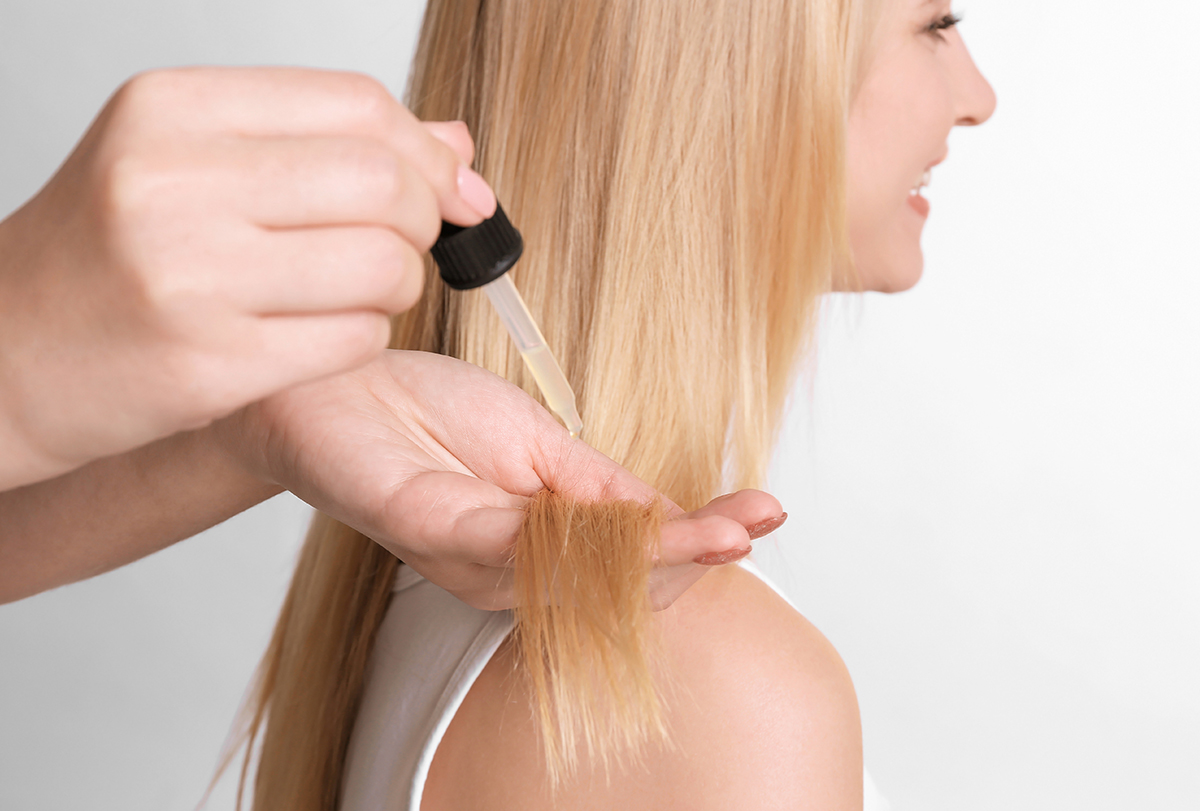
There are several plant oils that can promote hair growth. Some of them are used as carrier oils, whereas others are essential oils.
But don’t go wasting your precious time and money mindlessly dabbing any oil on your head in the hopes of making your hair grow faster and then just be disappointed later.
Read on to learn about some of the most widely studied and oft-recommended essential oils that can actually promote new hair growth and reduce hair loss.
Essential Oils That Promote Hair Growth
Here are some essential oils that you can use to achieve thick and healthy hair.
1. Rosemary essential oil
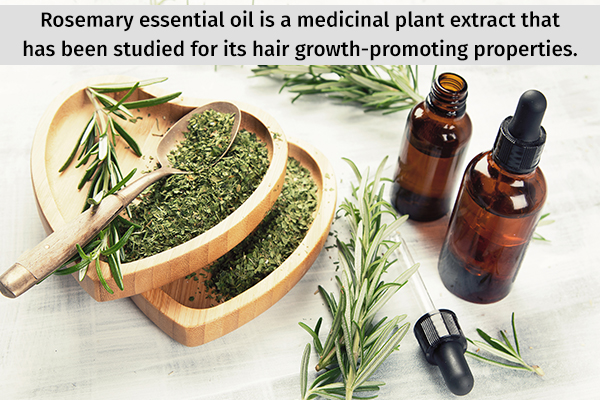
Rosemary essential oil is a medicinal plant extract that has been studied for its hair growth-promoting properties, although the studies have not been very extensive.
So far, there is only one single-blind randomized trial comparing the effects of this essential oil with the most commonly used solution for hair regrowth: minoxidil. And the results of this study were promising. (1)
How it works:
- Rosemary essential oil enhances microcapillary perfusion, which is the distribution of nutrients present in the blood to the surrounding cells within the dermal papillae.
- Rosemary essential oil increases the production of prostaglandin E2 fat molecules, which are known to promote hair growth.
- Rosemary essential oil reduces the production of leukotriene B4 molecules, an increased concentration of which has been shown to damage hair follicles and to be associated with excessive hair loss.
- Rosemary essential oil blocks the activity of an anomalous immune system, thereby preventing hair loss in the autoimmune disorder alopecia areata.
2. Peppermint essential oil
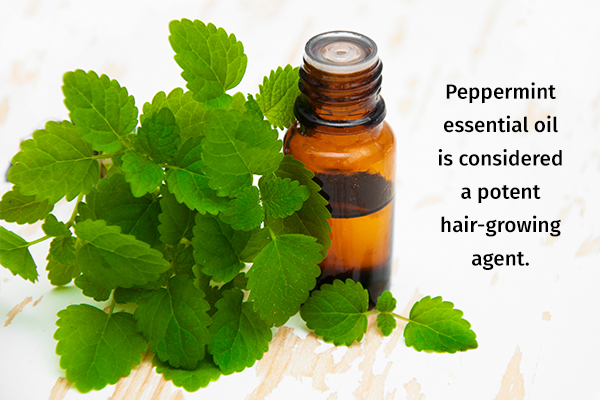
Peppermint essential oil is considered a potent hair-growing agent, although this claim largely rests on animal-based studies and needs to be confirmed by larger human trials.
Research done on rat subjects has found promising and significant parallels between the activity of peppermint essential oil and the popular hair growth formulation minoxidil in 2% concentration. (2)
How it works:
- The bioactive terpenes present in peppermint essential oil are readily absorbed into the scalp and then into the blood to stimulate the hair follicles.
- Peppermint essential oil increases the thickness of the hair strands by stimulating the IGF-1 gene, which is associated with hair thickness.
- Peppermint essential oil increases the length of the hair shaft without changing its original form or structure.
- Peppermint essential oil increases the length of the hair follicles.
- Peppermint essential oil increases the activity of the dermal papillae cells and the enzyme called alkaline phosphatase, which increases blood supply and distribution within the follicles.
3. Thyme and cedarwood essential oils
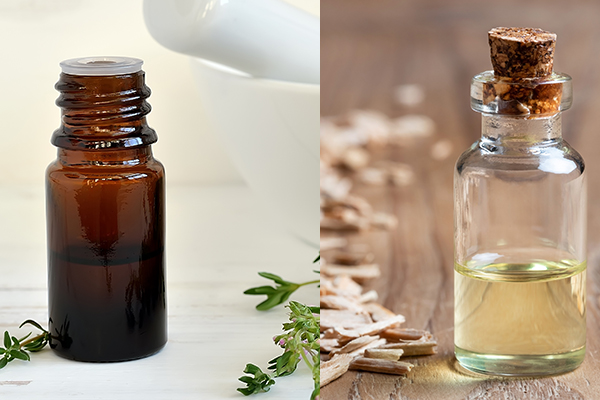
Thyme and cedarwood essential oils may help reduce hair loss and promote hair regrowth when used in combination with other essential oils including lavender, rosemary, and evening primrose oil for aromatherapy or head massage.
How they work:
Thyme and cedarwood essential oil have not been studied individually for their hair-growing properties, and therefore nothing can be said about the possible ways in which they can affect hair regrowth.
An old double-blind, randomized, controlled trial showed that 44% of the subjects that underwent aromatherapy and head massage with a blend of essential oils over a 7-month period reported a slight improvement in their hair growth. (3)
A more recent 12-week trial led to clinically significant hair growth in up to 75% of patients with alopecia who were treated with aromatherapy oils. (4) Based on the available evidence, aromatherapy and regular head massage with these essential oils seem to be good adjunct therapies for managing hair loss.
4. Tea tree essential oil
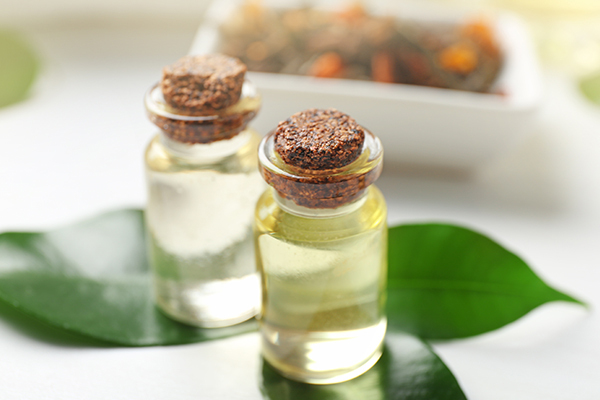
It has been suggested that alopecia or hair loss disorder might not stem from a single underlying cause but a number of different factors.
Thus, you may need hair growth formulations that include a variety of ingredients that can address all the diverse causative factors, rather than just one active ingredient that will only address part of the problem.
For instance, multimodal minoxidil microemulsion tends to be much more effective than plain minoxidil. (5) Adding tea tree essential oil to the formulation can further enhance its efficacy, but using it alone is unlikely to induce hair growth.
How it works:
Microbial overgrowth on the scalp damages the hair follicles and hinders hair growth. This is where tea tree oil comes in. It is recognized as a potent antimicrobial agent that can eliminate bacterial and fungal buildup on the scalp to keep it clean and healthy. (6)
Thus, tea tree essential oil helps banish scalp infections that can wreak havoc on your hair health and trigger further hair shedding.
Note: Several other essential oils, including lemongrass essential oil, (7) chamomile essential oil, (8) bergamot essential oil, sweet basil essential oil, and clary sage essential oil, (9) also exhibit similar antimicrobial properties but are not quite as strong or effective as tea tree oil.
How to Use Essential Oils for Improved Hair Growth
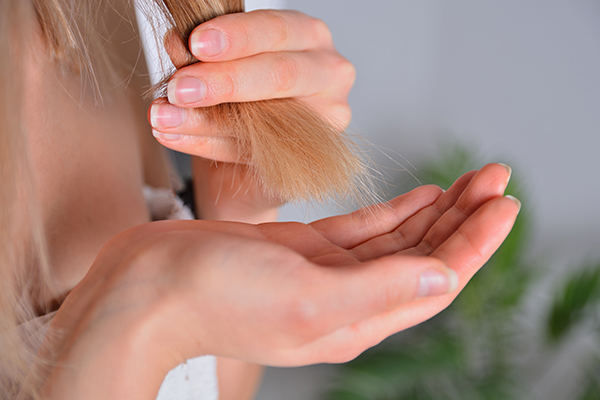
Aromatherapy and massage use essential oils such as cedarwood, lavender, thyme, and rosemary oils that have been used anecdotally for over 100 years to treat hair loss. (10) This technique involves massaging these essential oils into the scalp after mixing them in jojoba, coconut, olive, Moroccan argan, and/or grapeseed carrier oils.
How to make:
- Add 4–5 drops of any essential oil of your choice to 2–3 tablespoons of lukewarm carrier oil such as extra-virgin olive oil.
- You can also blend 2–3 different essential oils in a carrier oil to pack all their hair benefits into one mixture.
How to apply:
- Gently massage the oil blend into your scalp and apply it all over your hair.
- Let it sit for at least 20 minutes before rinsing it out with shampoo and plain water. If you want to give the oil more time to work, consider applying it at night and washing it the next morning. But this is only recommended for milder oils and not for the stronger ones such as thyme essential oil and tea tree essential oil, which can irritate your scalp and damage your hair after prolonged application.
- Give yourself this head massage at least 2–3 times a week.
Note: There are multiple varieties of thyme essential oil, but you must look for ones that contain thyme linalool, which is extremely moisturizing and thereby helps soften the scalp skin. Red thyme is to be completely avoided as it contains thymol, which can cause scalp irritation.
Caution: Essential oils are potent liquids that are too strong at their original concentration and therefore cannot be used directly. They need to be diluted in a carrier oil before application, or else they can sting, burn, or dry out your scalp and cause hair damage.
People with sensitive skin should be especially careful and patch-test the oil on a small area of unaffected skin (preferably the forearm or neck) to rule out any adverse reaction. If you experience skin irritation, do not use that essential oil and try a milder one. You can also reduce the amount of essential oil in the carrier oil to get a milder blend.
Major Factors That Influence Hair Growth
Each hair on your head sprouts from a tiny pore on your scalp that leads into a long, narrow tube-like structure called the hair follicle.
This follicle encapsulates that part of your hair shaft that is inside the scalp. It extends deep into the scalp and forms a bulge at its end, which is called the hair matrix. The hair matrix contains cells that proliferate to build your hair strand.
The dermal papilla is a finger-shaped projection that is embedded into the hair matrix from below. It contains specialized cells entangled with blood vessels, which provide nutrients and oxygen to the cells in the matrix.
This nourishment enables the differentiation of matrix cells for healthy hair growth. More blood supply means more oxygen and nutrients to the hair matrix, resulting in strong, thick, shiny hair.
Hair growth is a gradual process that occurs in four stages, namely, anagen, catagen, telogen, and exogen, which continue in a cycle. The anagen phase is when your hair grows to its full length and width. Thus, the duration of the anagen phase along with certain genetic factors determines how long and thick your hair will grow.
The following factors play a critical role in improving the quality and density of hair on your scalp:
- Number, size, and health of your hair follicles
- Blood circulation within the scalp
- Duration of the anagen phase
Various disorders that are characterized by hair loss negatively affect at least one of these key factors, and naturally, the solutions are directed toward fixing them.
General Queries
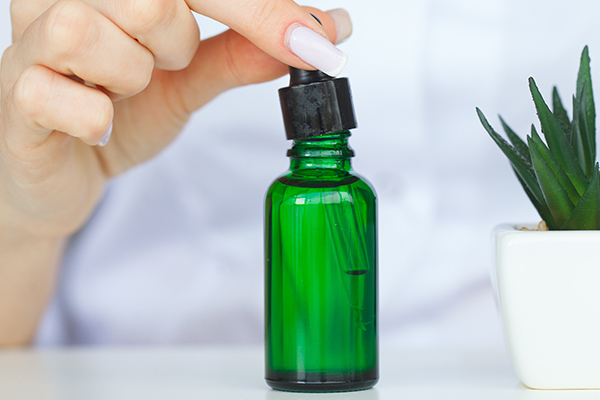
Can the geranium essential oil be used to promote hair growth?
There are different kinds of geranium essential oils extracted from different species of the same plant, such as the leaves of the African, European, or Asian species.
The main bioactive compounds of this oil are citronellol, geraniol, linalool, and menthone. Only the alcoholic extracts of the Siberian species of geranium have been studied for their hair-growing properties, which were traced back to certain chemicals found in it, mainly gallic acid and corilagin. (11)
However, the chemical composition of geranium extracts is different from that of its essential oil, which is why these findings cannot be applied to the latter. Since there are rarely any studies exploring or verifying the hair benefits of geranium essential oil, it cannot be recommended as a suitable candidate for managing hair loss.
Can cinnamon essential oil promote hair growth?
There are no studies on cinnamon essential oil so far to make any claims.
Recent research has brought to light the hair-growing properties of water-based leaf extracts of the cinnamon plant, (12) but these findings don’t apply to cinnamon essential oil. This is because essential oils (which are not soluble in water) are different from water-soluble plant extracts, even though both of them come from the plant leaves.
Final Word
Oil therapy is often regarded as the cornerstone of hair care and has been used for ages to improve the health, length, texture, and volume of hair. People generally use regular hair oils for this purpose but are slowly discovering the hair benefits that essential oils have to offer. Combining the two can deliver more nutrition to your hair follicles and possibly deliver faster results.
There have been many studies that favor the use of the aforementioned essential oils in promoting hair growth and minimizing hair loss, but more research is needed to conclusively establish their mechanism or effectiveness in this regard.
However, oil therapy cannot reverse hair loss by itself, unless used as part of an overall wholesome hair care routine. Plus, these topical measures can only go so far in strengthening your hair. You must consume a nutrient-rich diet to nourish your hair from within.
Also, protect your hair from external irritants such as dust, chemicals, pollutants, solar radiation, and heat the best way you can to make sure that the positive effects of oil therapy actually sustain.
Lastly, remember that hair growth is a long process, and natural solutions take their sweet time to work, so don’t get disappointed if you don’t see any visible improvement right away. Be patient and consistent with your hair care routine to achieve your desired results.
Caution: Essential oils are potent liquids that are too strong at their original concentration and therefore cannot be used directly. They need to be diluted in a carrier oil before application, or else they can sting, burn, or dry out your scalp and cause hair damage.
People with sensitive skin should be especially careful and patch-test the oil on a small area of unaffected skin (preferably the forearm or neck) to rule out any adverse reaction. If you experience skin irritation, do not use that essential oil and try a milder one. You can also reduce the amount of essential oil in the carrier oil to get a milder blend.
Major Factors That Influence Hair Growth
Each hair on your head sprouts from a tiny pore on your scalp that leads into a long, narrow tube-like structure called the hair follicle.
This follicle encapsulates that part of your hair shaft that is inside the scalp. It extends deep into the scalp and forms a bulge at its end, which is called the hair matrix. The hair matrix contains cells that proliferate to build your hair strand.
The dermal papilla is a finger-shaped projection that is embedded into the hair matrix from below. It contains specialized cells entangled with blood vessels, which provide nutrients and oxygen to the cells in the matrix.
This nourishment enables the differentiation of matrix cells for healthy hair growth. More blood supply means more oxygen and nutrients to the hair matrix, resulting in strong, thick, shiny hair.
Hair growth is a gradual process that occurs in four stages, namely, anagen, catagen, telogen, and exogen, which continue in a cycle. The anagen phase is when your hair grows to its full length and width. Thus, the duration of the anagen phase along with certain genetic factors determines how long and thick your hair will grow.
The following factors play a critical role in improving the quality and density of hair on your scalp:
- Number, size, and health of your hair follicles
- Blood circulation within the scalp
- Duration of the anagen phase
Various disorders that are characterized by hair loss negatively affect at least one of these key factors, and naturally, the solutions are directed toward fixing them.
General Queries

Can the geranium essential oil be used to promote hair growth?
There are different kinds of geranium essential oils extracted from different species of the same plant, such as the leaves of the African, European, or Asian species.
The main bioactive compounds of this oil are citronellol, geraniol, linalool, and menthone. Only the alcoholic extracts of the Siberian species of geranium have been studied for their hair-growing properties, which were traced back to certain chemicals found in it, mainly gallic acid and corilagin. (11)
However, the chemical composition of geranium extracts is different from that of its essential oil, which is why these findings cannot be applied to the latter. Since there are rarely any studies exploring or verifying the hair benefits of geranium essential oil, it cannot be recommended as a suitable candidate for managing hair loss.
Can cinnamon essential oil promote hair growth?
There are no studies on cinnamon essential oil so far to make any claims.
Recent research has brought to light the hair-growing properties of water-based leaf extracts of the cinnamon plant, (12) but these findings don’t apply to cinnamon essential oil. This is because essential oils (which are not soluble in water) are different from water-soluble plant extracts, even though both of them come from the plant leaves.
Final Word
Oil therapy is often regarded as the cornerstone of hair care and has been used for ages to improve the health, length, texture, and volume of hair. People generally use regular hair oils for this purpose but are slowly discovering the hair benefits that essential oils have to offer. Combining the two can deliver more nutrition to your hair follicles and possibly deliver faster results.
There have been many studies that favor the use of the aforementioned essential oils in promoting hair growth and minimizing hair loss, but more research is needed to conclusively establish their mechanism or effectiveness in this regard.
However, oil therapy cannot reverse hair loss by itself, unless used as part of an overall wholesome hair care routine. Plus, these topical measures can only go so far in strengthening your hair. You must consume a nutrient-rich diet to nourish your hair from within.
Also, protect your hair from external irritants such as dust, chemicals, pollutants, solar radiation, and heat the best way you can to make sure that the positive effects of oil therapy actually sustain.
Lastly, remember that hair growth is a long process, and natural solutions take their sweet time to work, so don’t get disappointed if you don’t see any visible improvement right away. Be patient and consistent with your hair care routine to achieve your desired results.
- Was this article helpful?
- YES, THANKS!NOT REALLY


